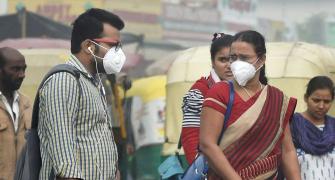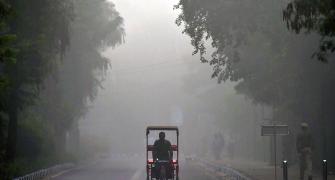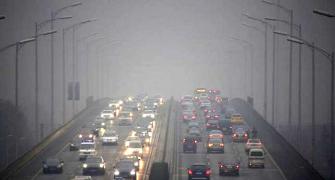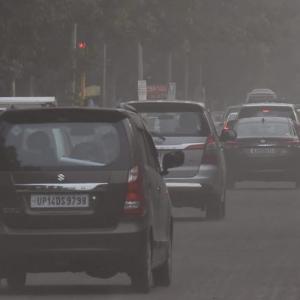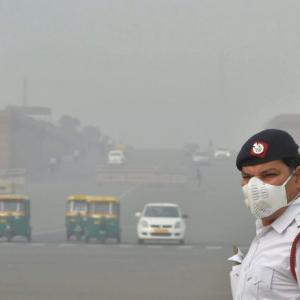Delhi’s air quality remained in the “very poor” category for the second consecutive day on Thursday, with several areas in the national capital nearing “severe” levels of pollution, according to the authorities.

The PM2.5 level (presence in the air of particles with a diametre of less than 2.5 micrometres) touched a new high at 158 as authorities predicted further deterioration of air quality in the coming days.
The PM10 level (presence in the air of particles with a diametre of less than 10 micrometres) stood at 332.
The PM2.5 is said to have a greater impact than PM10 on health and is said to be more dangerous.
The overall Air Quality Index of Delhi was recorded at 315, according to the Centre-run System of Air Quality Forecasting and Research.
An AQI between 0 and 50 is considered “good”, 51 and 100 “satisfactory”, 101 and 200 “moderate”, 201 and 300 “poor”, 301 and 400 “very poor” and 401 and 500 “severe”.
As the air quality worsened, Delhi’s Environment Minister Imran Hussain formed a six-member team to carry out surprise inspections in the city to check violations which contribute towards air pollution.
The minister said inspections would be carried out to check steps being taken by various bodies on the ground. He has also sought the details and schedule of working of the mechanical sweeping and sprinkling vehicles being operated by these bodies, including the public works department.
Hussain also directed the development agencies to ensure that all construction sites adhere to the Construction and Demolition Waste Rules, 2016 to avoid any dust emission from their activities.
Meanwhile, to encourage the use of public transport, the Delhi Cabinet on Thursday approved a proposal by which one can avail 10 per cent discount on using common mobility cards (metro card) in Delhi Transport Corporation cluster buses.
“The metro card usage started in DTC cluster buses on August 24. This was necessary in view of rising air pollution to encourage more and more people to use public transport,” Deputy Chief Minister Manish Sisodia told reporters.

He further appealed to the central government and the governments of Haryana and Punjab to initiate measures in the wake of the deteriorating air quality in north India, including Delhi.
“The Centre should intervene. Farmers have not been given subsidy. This is the failure on the part of the central and the state governments. As December and January is nearing, the entire north India, including Delhi, is close to becoming a gas chamber,” Sisodia said.
He said the state government had made several efforts since last year which improved Delhi’s air quality and had requested the Centre, as well as the governments of Punjab and Haryana, to take measures in this regard, but despite assurances, the air quality has deteriorated.
The Supreme Court-empowered Environment Pollution (Prevention and Control) Authority has already imposed since Monday the Graded Response Action Plan, which prescribes a set of measures to curb air pollution, after Delhi’s air quality deteriorated to “poor” category a few days back.
A senior Central Pollution Control Board official said the situation was being monitored and depending upon the quality of air, more stringent measures like increase of parking fees and complete ban on construction activities would be imposed.
“We are hoping that with slight improvement of meteorological conditions, the air quality would improve. But if it doesn’t, we will impose stringent measures,” he said.
In case of further deterioration of air quality to “severe” level, measures like stopping entrance of trucks, among others, can be enforced.
On Thursday, Anand Vihar recorded an AQI of 315, Dwarka Sector 8 369, ITO 256, Jahangirpuri 337 and Rohini 368, according to the CPCB.
The AQI on Wednesday was also recorded at 315. Faridabad, Ghaziabad, Gurgaon, Noida and Greater Noida had all recorded very poor air quality.
The data released by the CPCB shows that the air quality in the last three years has not improved much but officials also said a clear picture would emerge by end of this month.
A CPCB official said a number of factors were responsible for the deteriorating air quality, including vehicular pollution and construction activities.
On Wednesday, Hussain had said that satellite images showed crop residue burning at “dangerous” levels and had asserted that it should be stopped immediately or the entire north India would suffer serious health hazards.

